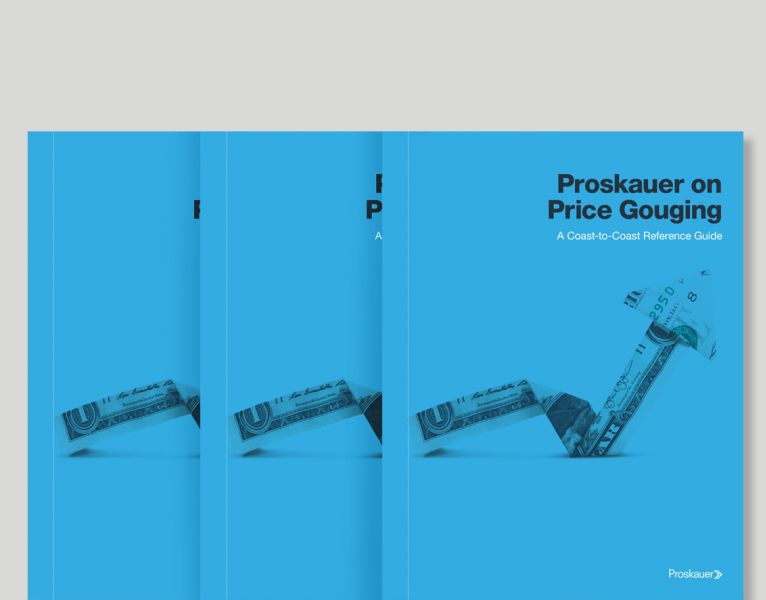Price gouging enforcement can apply to businesses at all levels of the supply chain, from manufacturers and producers, to wholesalers and even service providers. Without a federal price gouging statute, individual states have established their own price limits and enforcement policies, and they vary greatly. This can require companies to be well versed in statutes across all states in which they are active. Proskauer’s Antitrust Group has created an overview of individual state rules in our Proskauer on Price Gouging: A Coast-to-Coast Reference Guide. To help spot price gouging issues before they arise, below are Dos and Don’ts for use by businesses that operate on a multistate basis.
Dos:
- Identify all the states that may be covered by price gouging laws in which you sell products or services, and whether those laws are activated.
- Determine whether your goods and services are covered. Most price gouging statutes apply to essentials such as food, fuel, batteries, and medicine, but many also include critical services.
- Know the range of permitted price increases so you can monitor price gouging risks. State price gouging rules can use either an objective or subjective standard for determining whether price gouging has occurred, and some states have exceptions where input costs also increased.
- Track your baseline reference price(s). Price gouging statutes typically compare price increases during an emergency to prices from a previous period. Tracking these baseline reference price(s) may help you track your compliance with price gouging statutes.
- Track your costs and prices in order to assist with demonstrating that they fall within relevant exceptions to the price gouging statutes if the question ever arises.
- Document the reasons for price increases, and encourage employees to assess price gouging restrictions when sourcing inputs.
Don’ts:
- Don’t assume that price increases are not subject to price gouging statutes.
- Don’t assume that a bad motive is required to run afoul of the price gouging statutes. Most statutes do not require an unlawful motive; instead, they are triggered by certain price increases that exceed the baseline reference price from before the emergency.
- Don’t let index-based pricing run un-checked. Even states with exceptions for increased costs do not specifically permit exceptions for index-based pricing.
- Don’t let algorithms run amok. Many states permit price increases only where attributable to increased costs. Sellers may consider suspending or monitoring pricing algorithms for covered goods during the current state of emergency.
- Don’t hand control of pricing to agents or other downstream entities. State price gouging statutes can target sales regardless of whether they are made by the company or its agents, so companies may want to train sales forces and agents on compliance with price gouging rules.
- Don’t ignore early warning signs. Cases against supply chain companies often start with retailers pointing to upstream costs. Monitor early warning signs, such as consumer complaints, statements from state and local enforcers, newspaper articles, and other commentary about price gouging.
Price gouging compliance is not intuitive. Careful consideration and efforts are necessary to ensure large or small businesses are in compliance nationwide. Failure to do so can expose a company to unnecessary risk of monetary penalties and other enforcement measures.

